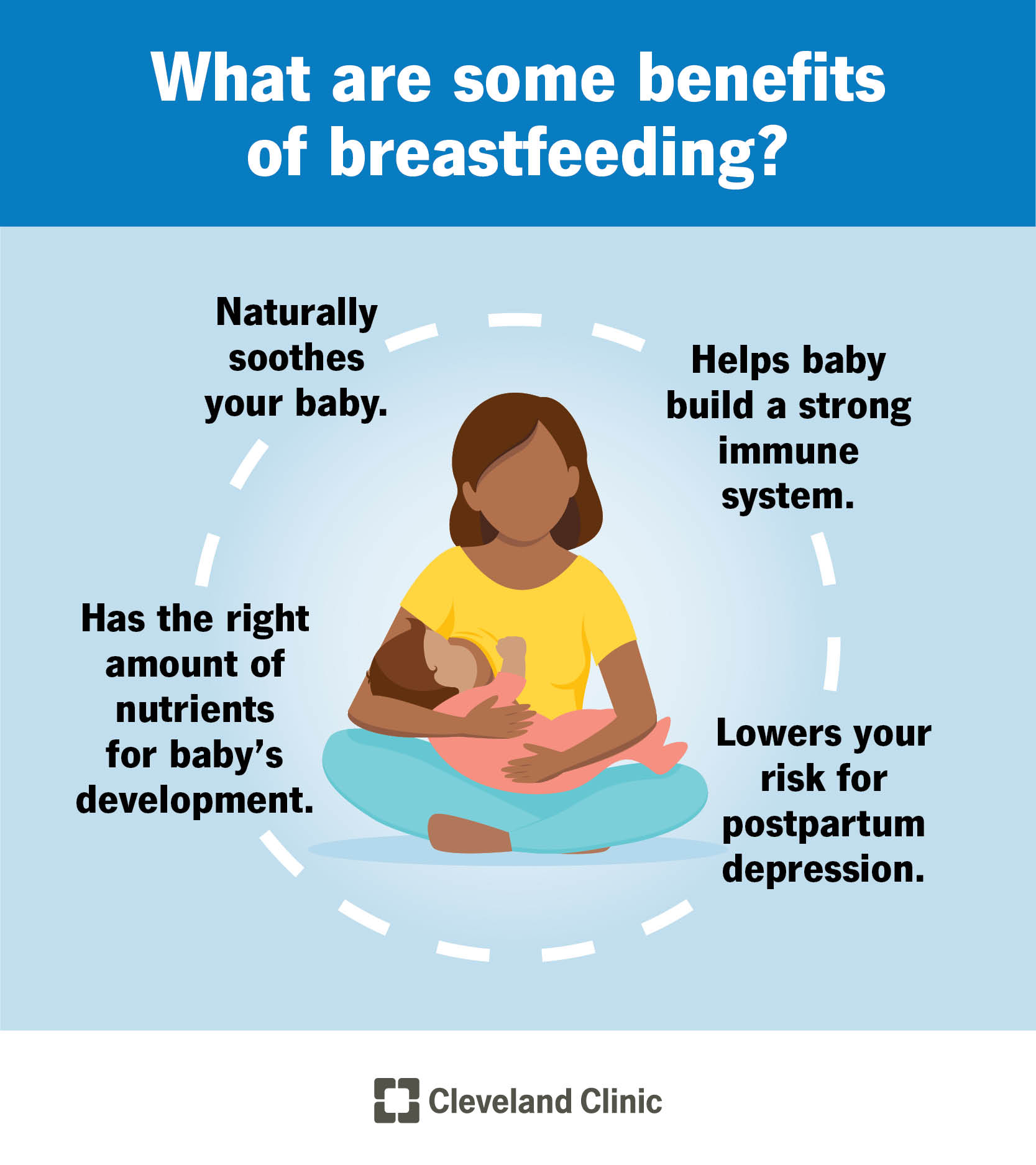Breastfeeding has many benefits for you and your baby. It helps build your baby’s immune system and offers the perfect nutrition. Some of the health benefits to you include a lower risk of breast and ovarian cancer.
Advertisement
Cleveland Clinic is a non-profit academic medical center. Advertising on our site helps support our mission. We do not endorse non-Cleveland Clinic products or services. Policy

Image content: This image is available to view online.
View image online (https://my.clevelandclinic.org/-/scassets/images/org/health/articles/15274-benefits-breastfeeding)
Breastfeeding has many health benefits for you and your baby. Understanding these benefits can help you decide if breastfeeding is right for your family.
Advertisement
Cleveland Clinic is a non-profit academic medical center. Advertising on our site helps support our mission. We do not endorse non-Cleveland Clinic products or services. Policy
Research suggests that breastfeeding lowers your baby’s risk of certain diseases and helps build a strong immune system. Breastfed babies have a lower risk of:
Studies show that breastfed infants have a lower hospitalization rate and tend to be in better health. This leads to fewer visits to their pediatrician for sicknesses.
Nutritional benefits of breast milk
Breast milk contains everything your baby needs to grow and develop. It provides a unique and specific formula of vitamins, minerals and antioxidants.
Breast milk supports your baby’s health because it:
Advertisement
Most healthcare organizations recommend exclusively breastfeeding your baby for at least six months. Once your baby is old enough for solid food, you can introduce foods and continue with breastfeeding for up to two years or longer.
It’s worth noting that if you exclusively pump, your baby is still getting the nutritional and health benefits of breastmilk.
Components of breast milk
There are many components of breast milk that meet your baby’s needs. These include:
Breastfeeding offers several benefits for you, too. In the months after delivery, breastfeeding lowers your risk for postpartum depression if breastfeeding is going well and you feel well-supported. It also benefits you much farther down the road, lowering your risk of developing:
Besides supporting your long-term health, breastfeeding has many other benefits for you, as well as for your relationship with your baby. These include:
Advertisement
Does breastfeeding help you lose weight?
Breastfeeding may make it easier for you to lose the weight you gained during pregnancy. Breastfeeding burns calories, which can help with weight loss.
But not everyone loses weight from breastfeeding. Researchers aren’t entirely sure why some women lose weight while breastfeeding and others don’t. Several other factors contribute to weight loss/gain, like calorie consumption, physical activity and sleep quality.
Healthcare providers recommend exclusive breastfeeding until your baby is about 6 months old. That’s because this early period is crucial for providing your baby with the nutrients and antibodies they need to grow and develop.
Breastfeeding still provides valuable nutrients and immune protection for your baby until their second birthday, and even beyond. That’s why healthcare providers advise you to continue breastfeeding after introducing solid foods. Breast milk and solid foods complement each other to nourish your baby.
As you move toward the milestone of exclusively breastfeeding for six months, here are some benefits for your baby along the way:
Advertisement
Breastfeeding beyond one year and up to two years continues to benefit your baby’s development and growth. But it can also benefit the breastfeeding mother. Research shows breastfeeding beyond one year can help lower your risk of breast cancer, ovarian cancer, high blood pressure and Type 2 diabetes.
In addition, extended breastfeeding can help soothe your baby and provide comfort in times of upset.
Studies suggest breastfeeding has a positive long-term effect on brain and behavioral development. However, there hasn’t been a study to confirm that a breastfed baby is smarter than a formula-fed baby. Feeding your baby with formula is also healthy and supports your baby’s growth and development.
Many factors can prevent you from breastfeeding exclusively or at all. For example, certain medical conditions or prior surgeries can impact your body’s process of producing and releasing milk (lactation). Or your work schedule or other constraints may make breastfeeding hard to manage.
If breastfeeding isn’t doable for you, you’re not alone. Talk to your baby’s pediatrician about the best formula for your baby. They’ll also tell you if donated breast milk is necessary to meet your baby’s needs and recommend a credible breast milk bank. Never buy breast milk online or from individual sellers. Such milk can be unsafe for your baby.
Advertisement
If your situation allows you to breastfeed but you’re facing challenges like low milk supply, talk to a lactation consultant or breastfeeding medicine specialist. These are certified health professionals who specialize in breastfeeding issues. They can help you overcome challenges that might otherwise make you stop breastfeeding.
One of the many decisions you’ll make as a mother is how to feed your baby. Before you decide, take time to understand the many benefits of breastfeeding. Some women aren’t able to fully breastfeed or breastfeed at all, and that’s OK. There are many formula options that will help your baby grow. Talk to your baby’s pediatrician to get information and support as you navigate life with your new baby.

Sign up for our Health Essentials emails for expert guidance on nutrition, fitness, sleep, skin care and more.
Learn more about the Health Library and our editorial process.
Cleveland Clinic’s health articles are based on evidence-backed information and review by medical professionals to ensure accuracy, reliability and up-to-date clinical standards.
Cleveland Clinic’s health articles are based on evidence-backed information and review by medical professionals to ensure accuracy, reliability and up-to-date clinical standards.
Breastfeeding is natural and rewarding, but it’s not without challenges. Get the support you need at Cleveland Clinic.
